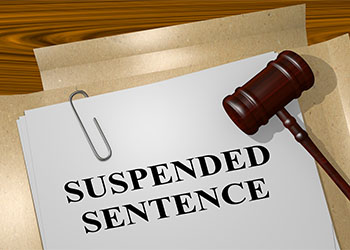What Is a Suspended Sentence?
Dec. 14, 2023
 Navigating the legal system can be daunting, especially when dealing with unfamiliar terms like "suspended sentence". If you're facing criminal charges, understanding what a suspended sentence entails could prove invaluable. This article offers an in-depth look at suspended sentences, including their benefits, potential risks, and eligibility criteria. It's designed to provide guidance to those entangled in a legal situation, helping you understand your options better.
Navigating the legal system can be daunting, especially when dealing with unfamiliar terms like "suspended sentence". If you're facing criminal charges, understanding what a suspended sentence entails could prove invaluable. This article offers an in-depth look at suspended sentences, including their benefits, potential risks, and eligibility criteria. It's designed to provide guidance to those entangled in a legal situation, helping you understand your options better.
If you're seeking an experienced attorney who can help you understand your options when facing a criminal charge, David Lee Sellers, PA, located in Pensacola, Florida, is ready to guide you. Don't hesitate to reach out and schedule your free consultation today, and let him help you explore your options and take the first step toward securing a favorable outcome for your case.
What Is a Suspended Sentence?
A suspended sentence happens when a judge gives a defendant a prison sentence, but then suspends, or delays, enforcing it. Instead of an immediate jail term, the defendant is placed under probation or must meet certain court-set conditions.
Essentially, a judge says: "I am giving you a sentence of X years, but I won't enforce it right now. If you can follow certain conditions (such as the completion of a probation period or community service), you can avoid a prison sentence." However, if they fail to meet the conditions, the judge has the right to enforce the original prison sentence. Thus, a suspended sentence gives the defendant a better option than prison, but there is still as a strong incentive to behave properly and fulfill any given conditions.
Who Is Eligible For a Suspended Sentence?
While the criteria can vary by jurisdiction, there are several common factors that courts consider when determining eligibility for a suspended sentence, including:
First-time Offenders: Typically, courts are more likely to give suspended sentences to those who have no prior criminal history. First-time offenders are often seen as suitable candidates for rehabilitation, thereby justifying the suspension of their sentence.
Nature of the Crime: If the crime committed is non-violent or minor in nature, a suspended sentence may be more likely. Serious or violent crimes are less likely to receive such leniency.
Potential for Rehabilitation: The court takes into account the defendant’s potential for rehabilitation. If it is determined that the defendant is likely to benefit from probation or community service rather than a jail term, a suspended sentence may be given.
Personal Circumstances: Courts may also consider the personal circumstances of the defendant. This can include things like their age, health condition, employment status, and family situation.
In all cases, the final decision ultimately rests with the judge, who will consider the specifics of the case and the applicable laws in the jurisdiction.
When Is It NOT an Option?
Despite the advantages of a suspended sentence, it's not always an option. Serious offenses such as murder or sexual assault often don't qualify for a suspended sentence. The same goes for repeat offenders.
If the court perceives the defendant as a high risk for re-offending or if the crime caused significant harm to others, a suspended sentence may not be considered. Consulting with a defense attorney is crucial to understanding the specific eligibility criteria in your jurisdiction.
Benefits of a Suspended Sentence
A suspended sentence offers several benefits to defendants. It provides an opportunity for rehabilitation, allowing individuals to seek employment and maintain family and community ties without the immediate threat of incarceration. It also helps prevent the negative consequences associated with a criminal record, such as difficulty finding employment or housing. Furthermore, a suspended sentence can serve as a second chance for individuals committed to turning their lives around.
Probation and Suspended Sentencing
Probation is often part of a suspended sentence. During this period, the defendant must comply with specific conditions such as regular check-ins with a probation officer, attending counseling or rehabilitation programs, and refraining from further criminal activity. Failing to meet these conditions can result in the activation of the original sentence, leading to imprisonment.
Can a Suspended Sentence Get Revoked?
Yes, a suspended sentence can be revoked if the defendant fails to adhere to the court's conditions. Common reasons for revocation include committing new crimes, violating probation terms, or failing to complete required programs. When a suspended sentence is revoked, the defendant may face immediate imprisonment, and the original sentence will be enforced.
Explore Your Options With a Skilled Defense Attorney
Understanding the ins and outs of a suspended sentence requires legal guidance. If you're considering a suspended sentence, David Lee Sellers, PA, is ready to provide the guidance you need. Serving clients throughout Crestview, Fort Walton Beach, and Milton, Florida, Attorney Sellers brings decades of criminal defense experience to the table. This law firm can help you navigate the legal process and protect your rights. Don't hesitate to reach out and schedule a free consultation today.
